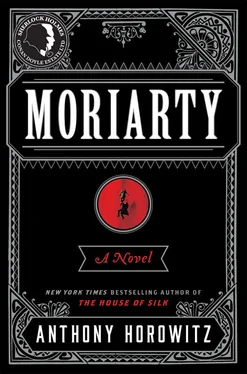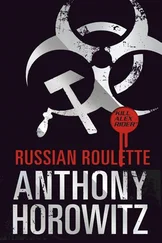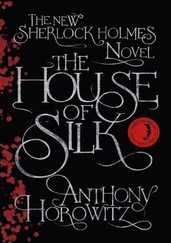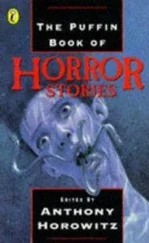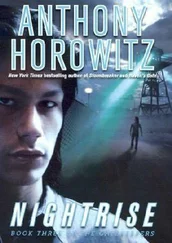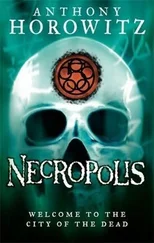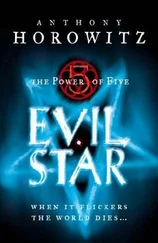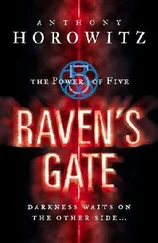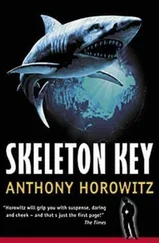Athelney Jones had produced a gun. Against all the rules, he must have carried it into the legation and it had been in his pocket all along. He brought it up and aimed at the child.
I took out my own gun. Jones looked at me and I think I saw shock, dismay and finally resignation pass through his eyes.
‘I’m sorry,’ I said, and shot him in the head.
21
The Truth of the Matter
It would appear, my dear reader, that I have deceived you—although, in truth, you are not very dear to me and anyway, I have taken the greatest pains to avoid any deception at all. That is to say, I have not lied. At least, I have not lied to you . It is perhaps a matter of interpretation but there is all the difference in the world, for example, between ‘I am Frederick Chase’ and ‘Let me tell you that my name is Frederick Chase’ which I remember typing on the very first page. Did I say that the body on the slab in Meiringen was James Moriarty? No. I merely stated, quite accurately, that it was the name written on the label attached to the dead man’s wrist. It should not have escaped your attention, by now, that I, your narrator, am Professor James Moriarty. Frederick Chase existed only in my imagination… and perhaps in yours. You should not be surprised. Which of the two names appeared on the front cover?
All along, I have been scrupulously fair, if only for my own amusement. I have never described an emotion that I did not feel. Even my dreams I have made available to you. (Would Frederick Chase have dreamed of drowning in the Reichenbach Falls? I don’t think so.) I have presented my thoughts and opinions exactly as they were. I did like Athelney Jones and even tried to prevent him pursuing the case when I learned he was married. I did think him a capable man—though obviously with limitations. His attempts at disguise, for example, were ridiculous. When he presented himself dressed as a pirate or a fisherman on the day we set out for Blackwall Basin, I not only recognised him, I had to work hard to prevent myself laughing out loud. I have faithfully recorded every spoken word, mine and others. I may have been forced to withhold certain details from time to time, but I have added nothing extraneous. An elaborate game, you might think, but I have found the business of writing a curiously tedious one—all those hours spent pummelling away at a machine that has proved unequal to the task of eighty thousand two hundred and forty-six words (a peculiarity of mine, the ability to count and to recall the number of every word as I go). Several of the keys have jammed and the letter e is so faded as to be indecipherable. One day, someone will have to type the whole thing again. My old adversary, Sherlock Holmes, was fortunate indeed to have his Watson, the faithful chronicler of his adventures, but I could afford no such luxury. I know that this will not be published in my lifetime, if at all. Such is the nature of my profession.
I must explain myself. We have travelled thus far together and we must come to an understanding before we go our separate ways. I am tired. I feel I have written enough already but even so it is necessary to go back to the start—indeed, even further than that—to put everything into perspective. I am reminded of the Gestalt theory proposed by Christian von Ehrenfels in his fascinating volume, Über Gestaltqualitäten —I was reading it, as it happens, on the train to Meiringen—which questions the relationship between the brain and the eye. There is an optical illusion that has become popular. You think you are seeing a candlestick. Then, on closer examination, you perceive that it is in fact two people facing each other. This has, in some ways, been a similar exercise though hardly quite so trivial.
Why was I in Meiringen? Why was it necessary to fake my own death? Why did I meet with Inspector Athelney Jones and become his travelling companion and friend? Well, let me turn on the electric light and pour another brandy. Now. I am ready.
I was the Napoleon of crime. It was Sherlock Holmes who first called me that and I will be immodest enough to admit that I was rather pleased by the description. Unfortunately, as the year of 1890 drew to its close I had no idea that my exile on St Helena was about to begin. The few scant details that he relates about my life are essentially correct and it is not my intention to expand on them very much here. I was indeed one of two boys—twins—born to a respectable family in the town of Ballinasloe, County Galway. My father was a barrister but when I was eleven or twelve years old he became involved with the Irish Republican Brotherhood and, knowing the danger into which this might place him, determined that my brother and I should be sent to England to complete our education. I found myself at Hall’s Academy in Waddington where I excelled at astronomy and mathematics. From there I went to Queen’s College, Cork, where I studied under the great George Boole and it was with his guidance that, at the age of twenty-one, I published the treatise on Binomial Theorem which, I am proud to say, caused quite a stir across Europe. As a result, I was offered the Mathematical Chair of a university which was the scene of a great scandal that was to change the course of my life. I do not intend to elucidate on the precise nature of that scandal, but I will admit that I am not proud of what took place. Although my brother stood by me, neither of my parents ever spoke to me again.
But the man had hereditary tendencies of the most diabolical kind. A criminal strain ran in his blood . . .
That was what Holmes—or Watson—wrote but they were quite wrong and my parents would have been mortified had they read it. They were, as I have said, respectable people, and there was never a hint of misconduct in my long family tree. My readers may find it hard to accept that an ordinary teacher might decide, quite deliberately, to break out into a criminal career, but such I assure you was the case. At the time, I was working as a private tutor in Woolwich, and although it is true that a number of my students were cadets from the Royal Military Academy which was close by, I was not quite the ‘army coach’ that has been stated. One of these, a pleasant, hard-working man by the name of Roger Pilgrim, had first accrued gambling debts and had thence fallen in with a group of swells. He came to me one evening in great distress. It was not the police that he feared—his own gang had turned on him over a small sum of money which they believed he owed and Pilgrim quite seriously believed he would be torn limb from limb. I agreed, somewhat reluctantly, to intercede on his behalf.
It was then that I made the discovery that was to change my life a second time, viz., that the criminal underclass—the thieves, burglars, counterfeiters and conmen who were the plague of London—were all unremittingly stupid. I thought I would be afraid of them. As things turned out, I would have felt more anxiety walking through a field of sheep. I saw at once that what they lacked, crucially, was organisation and that as a mathematician I was ideally suited to the task. If I could bring the same discipline to their nefarious activities that I could to binomial coefficients, I would create a force that could take on the world. I will confess that although it was the intellectual challenge that first interested me, I was already thinking of personal profit for I was growing tired of living hand to mouth.
It took me a little over three years to achieve my goals and perhaps one day I will describe that process, although it is, frankly, unlikely. Apart from any other considerations, I have never been one to blow my own trumpet. Anonymity has always been my watchword—after all, how could the police pursue a man whose very existence was unknown to them? I will merely say that Roger Pilgrim stayed with me and provided the physical support—which is to say, the persuasion—that was occasionally required although we very seldom resorted to violence. Not for us the heavy-handed methods of Clarence Devereux and his gang. We became close friends. I was the best man at his wedding and still remember the day his wife gave birth to their first child, Jonathan. And so, we arrive at the beginning.
Читать дальше
